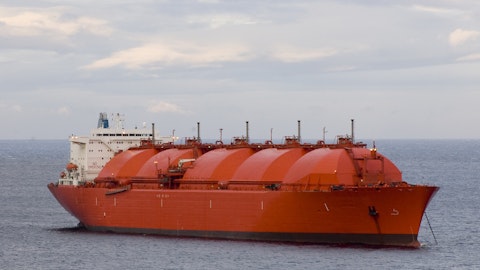Bart Kelleher: Or maybe also just that I think the cycle matters in terms of the useful life, and I think that side of it is separate from the technology. And so just we were studying the product anchor fleet and you see this large component of the fleet, 40% that the next five years is going to be over the age of 20 that if the cycle plays out, those are natural scrapping candidates. But if the market remains strong, the owner is trying to keep the incremental in it. Yes.
Anthony Gurnee: Yes. They’ll go out very fast. The other thing that also to keep in mind is those older ships are really, really inefficient. I mean they might burn 8 tons a day more than the newer ships too right so. Yes.
Unidentified Analyst: Tony, here we go. You asked me before we started something along the lines that you really wanted me to give you the slinger or something like that?
Anthony Gurnee: I was only joking.
Unidentified Analyst: Yes, I know. You said that something along the lines of the key to making money in shipping our cyclical business is buying low. I would argue the key is selling high. We’re kind of high now.
Anthony Gurnee: Right. Good question. And it’s not a slinger, it’s logical. Why don’t we just sell half the fleet. Well, we do run a really high-quality platform that needs a certain amount of scale to be able to generate the returns it does, and we think it’s got a lot of future value as well. We don’t need to sell ships for investors to be able to sell their position, right? So we’re not in a position where we need to sell down ships and distribute capital. That’s my own view. Okay. We’re gradually – what we’ve not done is grown a lot. And again, I want to emphasize, we’ve had plenty of opportunities to buy a lot of ships, but we haven’t done that. So I think we’re just focused on continuing to improve the performance and the cash flow that we’re generating from the kind of scale that we have today and waiting for opportunities.
But I think that if we were to scale back through vessel sales now, I think that would impair our ability to deliver value in the future.
Unidentified Analyst: [Question Inaudible]
Anthony Gurnee: What’s that? Good question. So Again, we – the great thing about having a lot of liquidity and 100% free float is that any time an investor wants to sell the whole thing; they can sell the whole thing. – right? Get out, right? So it’s – we don’t have to do that for them.
Unidentified Analyst: How flexible has the regular ship that you have become over the years in terms of dry cargo versus a wet cargo. And can you change the mode of shipment pretty quickly with newer technology.
Anthony Gurnee: So I think we work in a world of liquid bulk. So we – there are ship types that can switch back and forth and dry to wet. But one of the aspects of our ship type in our business, in particular, is the wide range of liquid bulk cargoes we carry. And theoretically, we could you never want to do it, but you can carry crude oil, well refined products, petrochemicals, in organics, et cetera. So I’ll actually hand this over to Gernot to answer a little bit because I think one of our underlying components of our strategy is to maximize our trading options by looking as many different types of cargoes as possible.
Unidentified Analyst: Follow-up on a different subject. What about insurance costs given what’s going on in the world today? How much have they risen or…?
Anthony Gurnee: Our D&O just went down by a lot, but they – but yes, do you want to talk about the machinery or?
Gernot Ruppelt: Yes. I mean with regard to more risk premiums and Red Sea transits to the extent we are – to the extent that anybody would still engage in those trades, obviously, as I showed, we have just negotiated options around the Cape, so we don’t really need to worry about voyage premiums, but typically, those would be a voyage cost and is either priced in or absorbed by the charter. But yes, they have gone up, no doubt.
Unidentified Analyst: But I would say that the standard insurance package that’s in OpEx in terms of whole machinery and P&I, that’s renewed on typically an annual basis, more at regular market levels and remains highly competitive process.
Gernot Ruppelt: If the world gets more peaceful with those insures costs drop and give you a better margin
Unidentified Analyst: So it will be more of a voyage expense impact. But in terms of the haul of machinery and P&I, I think that’s not as much so.
Anthony Gurnee: Yes. That market is driven more by kind of non-kinetic type of events, big oil spills, catastrophes, asbestos claims, that kind of stuff. And it’s just – it’s amazing how shipping – like our slip would be absorbed through reinsurance and shipping absorbed into the whole Lloyd’s, the world of reinsurance and we get impacted by things that you never imagined would impact us that have nothing to do with shipping.
Gernot Ruppelt: And maybe just to add, the way we conduct our business, our track record with the insurers, our safety standards, and how we’ve been able to avoid incidents where we would have to call into insurance cover. That certainly has an impact in terms of how you can do in terms of relative renewal rates, and that’s been quite favorable to the company.
Bryan Degnan: Okay. I’m seeing no further questions here in the room, and we’ll get on the webcast. So Tony, turn it to you for anything you want to say in closing?
Anthony Gurnee: No, just again, thank you all for coming, and good questions. I feel worked over.
Bryan Degnan: Thanks, everybody.
Follow Ardmore Shipping Corp (NYSE:ASC)
Follow Ardmore Shipping Corp (NYSE:ASC)
Receive real-time insider trading and news alerts



